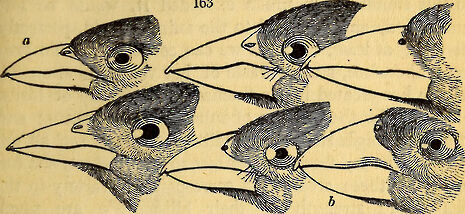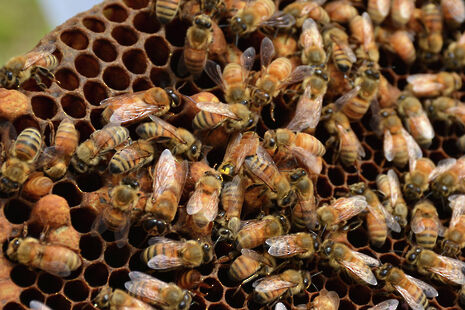Why does altruism evolve?
How can natural selection describe celebrities donating millions to charity? An exploration of why have humans broken the altruism trend seen in the wild

When Darwin formulated his theory of evolution, he found himself faced with a paradox. According to the theory, traits could only propagate through generations if they were advantageous to survival. The expected outcome gives a ruthless world, red in tooth and claw, defined by selfish, cutthroat behaviour – yet, reality couldn’t be further from that expectation. Nature is filled with examples not just of cooperation, but even outright altruism, seemingly flying in the face of Darwin’s survival of the fittest.
In The Descent of Man, he identified the clash between the egotism predicted by natural selection, and the selflessness that persisted in spite of it: “He who was ready to sacrifice his life, as many a savage has been, rather than betray his comrades, would often leave no offspring to inherit his noble nature.” How could it be that such virtuous behaviour was not weeded out by the reduced reproductive success it conferred?
To begin to answer this question, we need to first examine the origins of sociality. In biological terms, altruism need not mean a heroic deed of goodness – it simply refers to any behaviour that reduces the chance of the altruist’s reproductive ability, while increasing that of another. By extension, this implies some form of altruism involved in the evolution of the first multicellular organisms: for a group of independent cells to congregate into one body, some of them must lose their reproductive ability as they accept different jobs. In all human cells, only a portion may pass on their genetic material. The genes in your cells of your skin, your lungs, or your heart all die with you.
Kin selection is unable to explain a socialite donating millions to charity, or a soldier dying for their country
Herein lies the crucial detail – every single cell in your body contains the same genetic information, so although a skin cell cannot reproduce, it will still remain represented in the gametes, and consequently shall exist in the genome of offspring. This extends to interactions between different individuals of the same species – the more closely related, the more feasible altruistic behaviour turns out to be. If an animal gives up its life to save a sibling, the genes that made it behave selflessly are likely to be present in that sibling, who is in turn likely to survive in order to pass on those altruistic genes.

This preservation of altruistic behaviour is referred to as kin selection, and it has had dramatic consequences in nature. Eusocial insects such as ants and bees take this familial cooperation to its logical conclusion, with a single breeding queen served by an army of sterile workers ready to sacrifice their lives for their mother. Similar levels of loyalty exist in human families, but kin selection is unable to explain a socialite donating millions to charity, or a soldier dying for their country.
This is because human social behaviour is governed by a far more complex network of rules. Despite having cultural determinations mixed with genetic, it must still have its origins in natural selection like anything else. Although we are predisposed to put our families first, we nonetheless observe random acts of kindness towards total strangers: how have we developed the capacity to help unrelated individuals?
Understanding altruism in humans requires a distinction between evolutionarily driven ‘hard’ altruism, which is performed without thought of reward, and modern ‘soft’ altruism, which is contingent on some level of reciprocity. There is little survival value in aiding someone you are unlikely to ever see again, but if it is someone who you see frequently, who may be later able to help you in return, the advantages of soft altruism immediately become clear. One need only look at the contrast between the friendliness of small villages, and the indifference or outright hostility of big cities like London or New York, where the anonymity of millions makes shouting at a stranger commonplace.
If the fundamental basis of all human kindness is just tit-for-tat, should we be worried about what this means for our virtue as a species? Suggesting that humans have no inherent morality sounds like a scathing indictment of our kind, but it could instead mark a monumental achievement. Evolution gave us an innate loyalty to our closest kin, and a propensity to socialise and cooperate as long as it benefits us directly, but little else. In spite of this, we have broken out of natural selection’s ruthless grip and devised belief systems built on selflessness that truly has no competitive purpose. Evolution did not give us goodness – we did that ourselves.
 News / Colleges charge different rents for the same Castle Street accommodation2 March 2026
News / Colleges charge different rents for the same Castle Street accommodation2 March 2026 News / King’s hosts open iftar for Ramadan3 March 2026
News / King’s hosts open iftar for Ramadan3 March 2026 Theatre / Lunatics and leisure centres 4 March 2026
Theatre / Lunatics and leisure centres 4 March 2026 News / Angela Merkel among Cambridge honorary degree nominees27 February 2026
News / Angela Merkel among Cambridge honorary degree nominees27 February 2026 News / News in Brief: waterworks, wine woes, and workplace wins 1 March 2026
News / News in Brief: waterworks, wine woes, and workplace wins 1 March 2026








